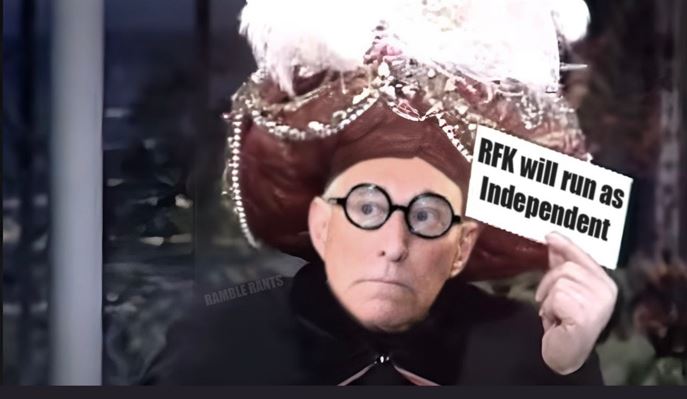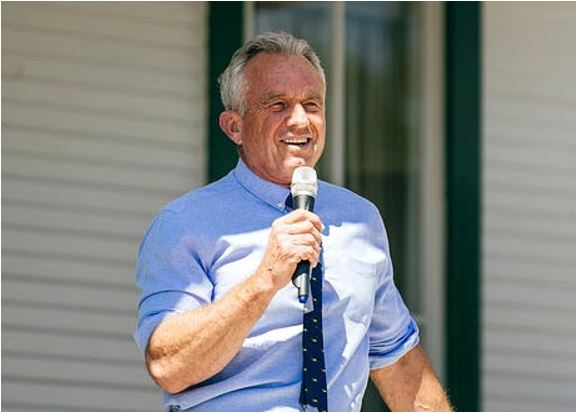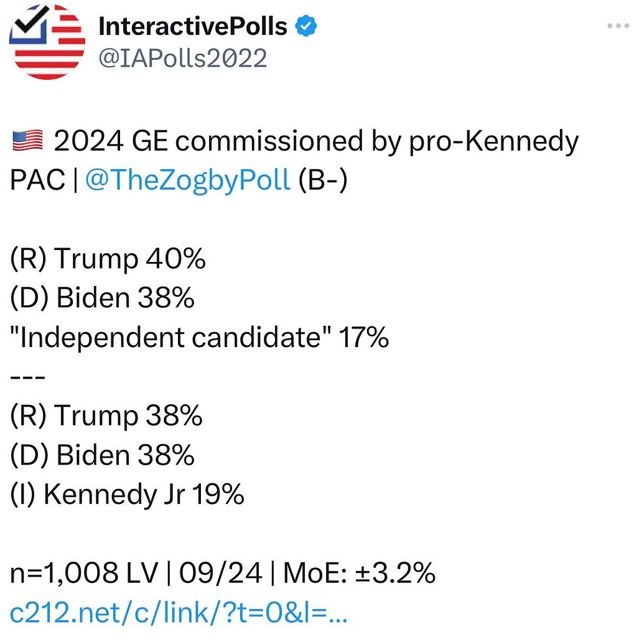
RFK Jr. Going Independent; What’s the Fallout?
By Roger Stone
I predicted several days before Mediaite that Robert F. Kennedy Jr. would abandon his bid for the Democrat Presidential Nomination to seek election as an Independent.
I predicted several days before Mediaite that Robert F. Kennedy Jr. would abandon his bid for the Democrat Presidential Nomination to seek election as an Independent.

Given the manipulation of the Democrat National Committee rules governing the selection of delegates to nominate their candidate for President, the decision by the scion of the Kennedy dynasty is not surprising. There was no reasonable path forward in a rigged process.
First let me say that contrary to the claims of many trolls on social media, I am neither a close friend or advisor to Robert Kennedy, nor did I (allegedly in combination with Steve Bannon!) urge Robert Kennedy to run for President. These left-wing conspiracy theories are based on the fact that I met young Kennedy one time at a conference in which we were photographed together. I have lauded RFK Jr. for his health freedom, border security and pro-peace positions, as well as his intellect.
Sadly, that innocent photograph has been used over and over again by the Biden Campaign Research Operation in an attempt to discredit RFK Jr. and dismiss his candidacy as some kind of psy-op designed to weaken incumbent Joe Biden to the benefit of President Donald Trump. That is both false and absurd.
That said, the best thing about Kennedy’s campaign is Kennedy himself. He is both energetic and engaging on the stump, and has made excellent use of optimistic and unifying language—positioning himself as the “Peace and Freedom” Candidate. He has also proved to be substenative; I have yet to see him make a claim or assertion that he could not back with an authoritative study or source.

It is extraordinarily important to note that getting on the ballot as an Independent (rather than as a minor party candidate) is an extraordinarily difficult, legally arcane, highly technical process which is both financially and manpower intensive. The process is governed by 50 different state laws which range in complexity from the simple to the virtually impossible. It is important to note that the laws governing ballot access for Independents or minor party candidates are written by Republicans and Democrats working together to avoid any real competition and to make ballot access as difficult as possible.
While reports in The New York Times that RFK Jr. had friendly conversations with the National Libertarian Party, there is actually no indication that RFK Jr. is either a good fit for or intends to pursue that party’s nomination. The only advantage to be the Libertarian Party Nominee would be automatic ballot status in approximately 30 states—leaving another 20 states in which the party has vast successful experience in gaining ballot access through petitioning. While RFK Jr. does have some Libertarian views, he is, in fact, not a very good fit for a party that puts a very high premium on issue purity.
For the purposes of this article, let us assume that Kennedy achieves ballot status in enough states to secure 270 electoral votes.
(I stress that I am not convinced that that will ultimately be the case, but for the purposes of today’s analysis, let us accept that assumption.)
In the hours and days since news of an impending Independent Kennedy candidacy have leaked, there has been wide conjecture about how such a candidacy would impact a renominated Republican President, Donald Trump, and the Democrat Nominee (for the sake of today’s discussion), Joe Biden.
Polling produced by a super PAC supporting RFK Jr. from a reputable pollster seems to indicate that an Independent RFK candidacy pulls votes disproportionately from Donald Trump.

Interestingly, Robert Kennedy Jr. himself said this was the case in a recent interview with Theo Von.
This would be logical because virtually every poll has consistently shown RFK with a substantially higher approval rate among Republicans than among Democrats and Independents. One reason for this is the fact that RFK has generally been relegated to coverage by conservative alternative media outlets, and because his criticism of the COVID-19 vaccination and his opposition to the war in Ukraine have been featured in much of that coverage.
It is a misnomer, however, to assume that the votes of Independent or minor party candidates are detracted from either Republicans or Democrats. Take, for example, the candidacy of Dr. Cornel West (who is most likely to be the Green Party Candidate for President). To assume that all of West’s voters are progressives who would otherwise vote for the Democratic Nominee is inaccurate. If history is a guide, roughly half of West’s ultimate voters would not vote at all, other than to vote for him. While it is fair to say that roughly the other half would, indeed, come from the Democrat ranks.
It would also be useful to note the history of past viable Independent or third party candidacies. Both Ross Perrot in 1992 and George Wallace in 1968 polled higher prior to Labor Day, but saw their numbers diminish as Election Day came closer and voters focused on the fact that neither could win and that a vote for Perrot or Wallace might be “wasted” and bring the election of the candidate they wanted the least.
It is not possible to more accurately gauge the ultimate impact of an RFK candidacy without first seeing the impact of his formal announcement, as well as seeing in the final analysis how many states he actually gets on the ballot in. We will be monitoring the situation for future coverage.
From rogerstone@substack.com
